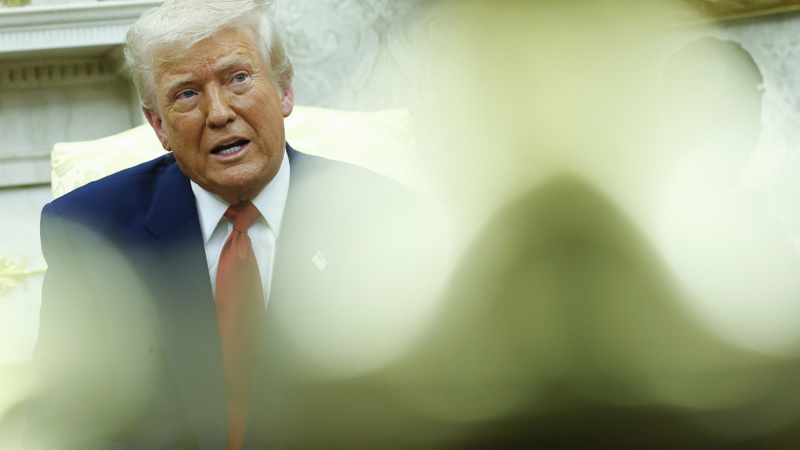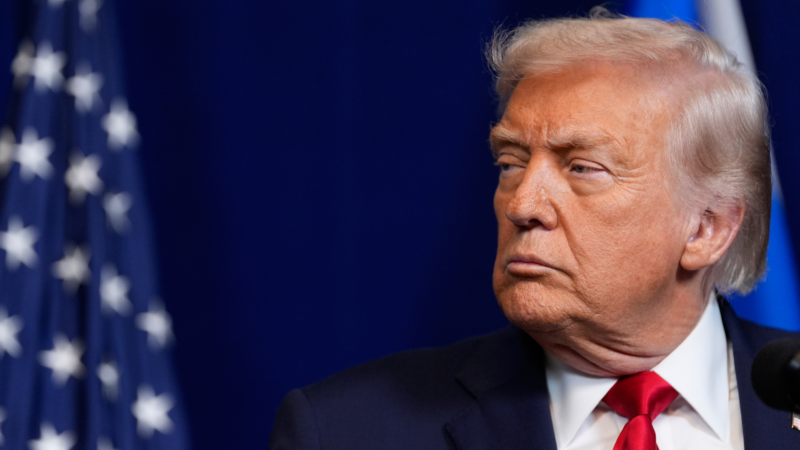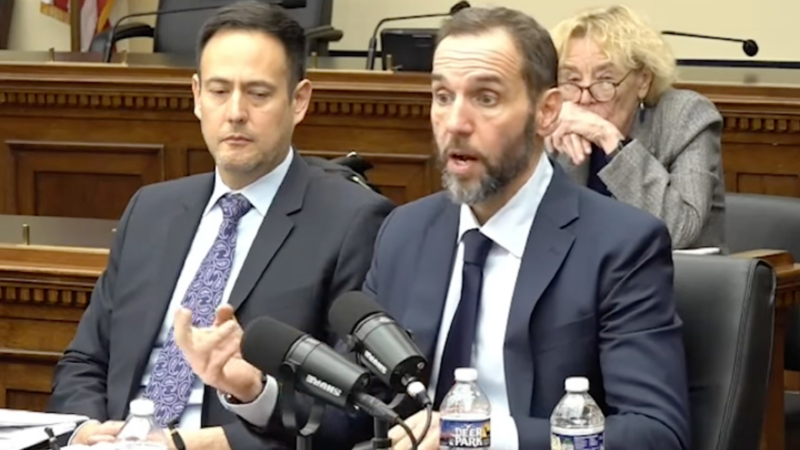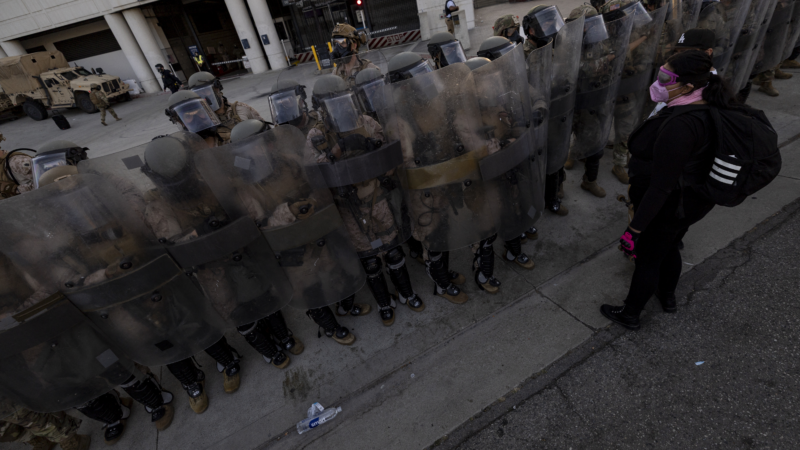Mixed messages on tariffs raises scrutiny on Trump aides
President Trump is boasting about the wheeling and dealing he’s doing to cut deals on steep new tariffs that take effect on Wednesday. But for weeks, his own aides have insisted that tariffs were not a bargaining chip.
Trump has said he wants to see manufacturing return to the United States — the kind of big-dollar investments that businesses are reluctant to make unless there is certainty that policies are not about to suddenly shift. But he has now opened the door to talks with a long list of countries trying to strike their own deals for tariff relief.
“There can be permanent tariffs — and there can also be negotiations because there are things that we need beyond tariffs,” Trump told reporters this week.
The conflicting message is just the latest example of how hard it can be for Trump’s aides to try and sell his ever-evolving trade agenda. It has increased scrutiny on Commerce Secretary Howard Lutnick and Treasury Secretary Scott Bessent who are tasked with explaining his plan to people on Wall Street and Main Street who have been spooked by the sharp downward market moves sparked by the tariff announcement.
Lutnick and Bessent brought Wall Street credentials to their jobs
Lutnick, the former CEO of financial services firm Cantor Fitzgerald, and Bessent, a former hedge fund investor, were picked for their cabinet jobs because their experience provided some assurance to Wall Street that there were steady stewards at the helm.
But they have both taken hits to their credibility over the rollout of potentially trillions of dollars in new tariffs that have rocked stock markets and spread uncertainty across the globe, said Daniel Drezner, a former international economist at Treasury and a former Republican.
“What you’ve seen for the last two months, two plus months, is evidence that, in fact, Bessent is not in charge of foreign economic policy. Neither is Lutnick. It’s Donald Trump,” said Drezner who now teaches international politics at the Fletcher School of Law and Diplomacy at Tufts University.
Last month, Bessent laid the ground for tariffs by warning Americans that long-term economic gain could not occur without some short-term pain.
“Access to cheap goods is not the essence of the American Dream,” he told members of the Economic Club of New York last month.
Lutnick has done dozens of interviews, often channeling Trump’s tough rhetoric.
On CNBC last week, he said the U.S. needs to “to stop supporting the rest of the world and start supporting American workers.”
Last week, he insisted it was too late for countries to try and negotiate.
“I don’t think there’s any chance that President Trump’s going to back off his tariffs. This is the reordering of global trade,” Lutnick said on CNN.
But within hours of that interview — with Lutnick standing right behind him — Trump told reporters on Air Force One that he would be open to negotiating. “Every country is calling us. That’s the beauty of what we do,” Trump said. “We put ourselves in the driver’s seat.”
The problem with mixed messages
Top aides have a fine line to walk when their boss changes the message, says Caitlin Legacki, who was a senior adviser in former President Joe Biden’s Commerce Department.
She said they have to be able to maintain their credibility while not angering their boss.
“Especially for people like [Bessent and Lutnick], there’s huge potential damage to their reputations outside of Washington, D.C.,” Legacki said.
She said they also risk being blamed by Trump if he doesn’t think their sales job was good enough.
On Sunday, Bessent and Lutnick tried to do some damage control.
Bessent was cautious when asked directly if the tariffs were permanent. “That’s going to be a decision for President Trump,” Bessent said on NBC’s Meet the Press. “But I can tell you that as only he can do at this moment, he’s created maximum leverage for himself.”
But over on CBS’ Face the Nation, Lutnick sought to hold the line.
“There is no postponing,” Lutnick said. “They are definitely going to stay in place for days and weeks. That is sort of obvious. The president needs to reset global trade.”
There are other trade voices in Trump’s orbit, too
Another factor is the number of people who speak for Trump on trade — experts who don’t necessarily share the same opinions. Trump’s adviser Peter Navarro, for example, has long taken hardline positions on trade. Navarro and Elon Musk, who advises Trump on government restructuring but doesn’t like the tariffs, openly fought in interviews and on social media this week.
The White House said it shows Trump is willing to listen to people with diverse views as he weighs his decisions. Spokesman Kush Desai said Trump has assembled the “best and brightest economic team in modern history.”
“President Trump has rightfully identified the trade deficits that our country has run for decades and that are responsible for decimating our industries and communities as a national emergency,” Desai said. “Instead of prioritizing special interests, President Trump once again acted in the best interest of our country and our citizens when he made his decision on reciprocal tariffs.”
But the market turmoil could have been avoided if the tariff roll-out had been clearer or more consistent, said Republican strategist Alex Conant, who represents some companies impacted by tariffs.
“The messaging is all over the place,” Conant said. “They talk about the need for tariffs to cut the deficit. They talk about the need for tariffs to bring manufacturing jobs home. But they also talk about the need for tariffs in order to make trade more fair. All three of those cannot be true at the same time – which makes it a tough sales job,” he said.
Zohran Mamdani sworn in as New York City mayor, capping historic rise
Mayor Zohran Mamdani took the oath of office in New York City after midnight Thursday. The city's first Muslim mayor, a member of the Democratic Socialists of America, has promised to focus on affordability and fairness.
Rising from the ashes, a symbol of hope at the Rose Parade
Survivors of the Eaton and Palisades Fires find healing and community working on a Rose Parade float to honor the lives and communities lost in last year's wildfires.
The history behind the NYC subway station chosen for Mamdani’s swearing-in
The city shut down the station in 1945 on New Year's Eve. Eighty years later, it's a symbolic venue choice for the incoming mayor's private swearing-in ceremony.
U.S. military strikes 5 more alleged drug boats, killing 8
The U.S. military says it struck five alleged drug-smuggling boats over two days. The attacks killed eight people, while others jumped overboard and may have survived. U.S. Southern Command did not reveal where the attacks occurred.
Capitol riot ‘does not happen’ without Trump, Jack Smith told Congress
Former special counsel Jack Smith also described President Trump as the "most culpable and most responsible person" in the criminal conspiracy to overturn the 2020 election results, according to a transcript of Smith's closed-door interview with the House Judiciary Committee.
Trump will drop push for National Guard deployments in Chicago, LA and Portland, Ore.
Courts blocked troops from deploying in Chicago and Portland, Ore., and the Los Angeles deployment effectively ended after a judge blocked it earlier this month.







